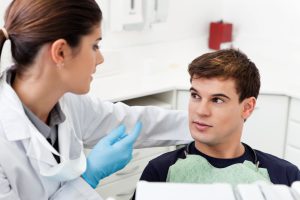
In my previous blog, I explored three common positive responses I’ve encountered from patients when offering a test for oral HPV and how I would respond to them. In this blog, I will address some of the objections from patients and how I would further educate the patient about oral HPV and testing options.
Patient 1: I don’t think I need that test. I’ve never been exposed.
Response 1: I understand but in case you’re ever curious, remember we have this potentially life-saving service and we’re happy to provide it at your request. Here is an educational brochure for your review.
Comment 1: Chart documentation of this communication is important. In the patient’s chart indicate the oral HPV test was offered but the patient declined at this time. Some clinicians will have the patient sign a waiver when the test is declined. In my experience, many patients who decline this test at first will ask for it in the future.
There are many resources for purchasing patient education materials; however, OralDNA® Labs provides patient brochures about OraRisk® HPV testing FREE of charge. Also, the National Institute of Dental and Craniofacial Research provides educational publications free of charge at www.nidcr.nih.gov.
Patient 2: I can’t afford that right now. Will my insurance pay for the test?
Response 2: I understand. We can provide you with the medical/dental codes to check with your insurance plan, however unfortunately insurance often doesn’t pay for all preventive services. Just like the medical model of testing, screening for risk may help to limit future expenses associated with oral or systemic diseases discovered at later stages. Maybe you would like to do the test at a separate appointment or at your next dental hygiene appointment.
Comment 2: Dental patients are often accustomed to paying for other services and/or products at their dental hygiene appointments that insurance doesn’t cover. I’ve found that many patients will be happy to pay for an OraRisk® HPV test at a separate appointment or when they are not receiving additional services. Simply remember to offer the test option.
Patient 3: I’ve heard there is nothing I can do about it if my test is positive for oral HPV. So why even look?
Response 3: Knowing your risk based on an oral HPV lab test can play a powerful role in prevention. Early oral HPV infections do not typically cause any clinical signs or symptoms. We may choose to monitor you more closely to look for and investigate any early signs of tissue changes and we will educate you on symptoms that need to be reported, such as a persistent cough, lump or swelling, etc. We know that most oral HPV infections will be “cleared” by our own immune response. With that knowledge, you may decide to explore ways to boost your immune response such as nutritional optimization, quality sleep, stress reduction and avoiding other influences (i.e. smoking, excess alcohol) that may contribute to the development of oral cancer.
Comment 3: OralDNA® Labs’ OraRisk® HPV test is a non-invasive, easy-to-use screening tool to identify the presence or absence of certain types of oral HPV, a mucosal viral infection that could potentially lead to oral cancer. OraRisk® HPV enables the clinician to establish increased risk for oral cancer and determine appropriate referral and monitoring conditions.
While the standards and procedures of dental care tend to change over time, I believe the foundation of exceptional patient care will always remain in patient education. It’s my belief that it is not in the best interest of our patients to leave the topic of oral HPV out of our conversations and oral cancer exams. In fact, a recent article published in the Journal of The America Dental Association states, “Educating patients about the risk factors for oral cancer now must include a discussion of HPV infection, as well as alcohol and tobacco use.”1 So, the question is, “Do you speak HPV?”
Please comment to share your thoughts on educating and/or testing patients for Oral HPV!
References
- https://jada.ada.org/article/S0002-8177(18)30762-1/fulltext
For more information on how to become an OralDNA Provider – scan HERE: 
- Consumer-Friendly Lab Reports - October 6, 2023
- Microbiology Terminology - March 24, 2023
- Microbiology 101 - January 3, 2020
